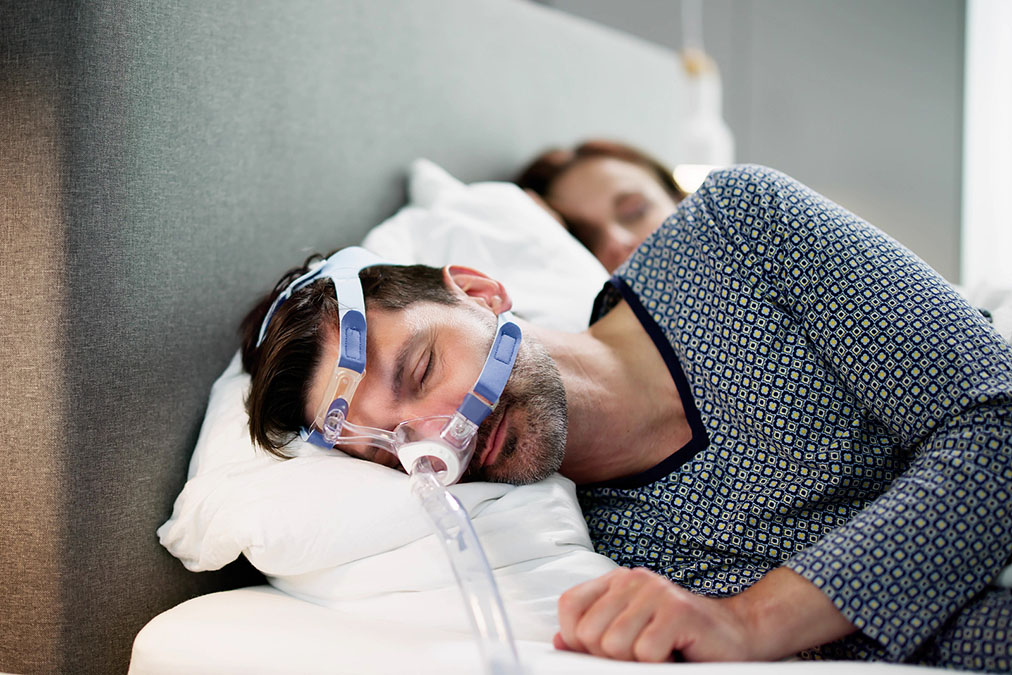 Sleep apnea has been connected to several serious conditions, such as obesity, heart disease, stroke, and dementia.
Sleep apnea has been connected to several serious conditions, such as obesity, heart disease, stroke, and dementia.
How exactly does sleep apnea cause these diseases, and what can you do to prevent it?
A new study in the journal Neurology reveals exactly how sleep apnea damages your brain and what you can do to stop it.
The authors wanted to see exactly what brain changes occur in people with sleep apnea and in people who spend very little time in deep, slow-wave sleep. This is very common in sleep apnea patients.
Sleep apnea is a condition in which a person’s breathing repeatedly stops and starts during sleep, leading to less oxygen reaching the brain and to poorer quality sleep than in people without sleep apnea.
The study involved 140 people, all suffering from this condition. They were initially recruited by the Mayo Clinic Study of Aging. None of them had dementia, and an MRI scan of the brain and a sleep study were offered to all of them.
The scientists’ main focus was on changes in the white matter of the subjects’ brains. White matter is the part of the brain that contains nerve fibers. Its health is crucial as it helps different parts of the brain communicate with each other.
They looked at two markers of white matter health: white matter hyperintensities (small lesions or damaged areas seen on brain scans), which often increase with age or uncontrolled high blood pressure, and the integrity of axons (nerve fibers that connect nerve cells).
This is what they found.
-
1. White matter hyperintensities and axonal integrity were more prevalent in participants with severe sleep apnea.
2. There was an increase in the quantity of white matter hyperintensities comparable to the effect of aging 2.3 years and a drop in axonal integrity comparable to aging 3 years for every 10-point decrease in the proportion of slow-wave (deep) sleep.
3. Participants with severe sleep apnea had higher volumes of white matter hyperintensities and reduced axonal integrity than those with milder sleep apnea.
Thus, if you have sleep apnea, there is a good chance that your brain is suffering physical damage to the tissue that allows different brain regions to communicate. It is not surprising that sleep apnea has been linked with everything from stroke to cognitive decline to Alzheimer’s disease.
The scariest thing is that there is no medical treatment for these changes in the brain, so once they have happened, they are there to stay.
If you suffer from sleep apnea, you must start healing it right now, before the damage done to your brain is irreversible. Fortunately, you can cure snoring and sleep apnea in as little as three minutes using the simple throat exercises found here…

 Overcoming IBD
Overcoming IBD Multiple Sclerosis
Multiple Sclerosis Banishing Bronchitis
Banishing Bronchitis Gum Disease Gone
Gum Disease Gone Overcoming Onychomycosis
Overcoming Onychomycosis Neuropathy No More
Neuropathy No More The Prostate Protocol
The Prostate Protocol Brain Booster
Brain Booster
 Ironbound
Ironbound
 Solution for Shingles
Solution for Shingles
 The Bone Density Solution
The Bone Density Solution
 The Ultimate Healing Protocol
The Ultimate Healing Protocol
 The Parkinson's Protocol
The Parkinson's Protocol
 The Chronic Kidney Disease Solution
The Chronic Kidney Disease Solution
 Overthrowing Anxiety
Overthrowing Anxiety The Fatty Liver Solution
The Fatty Liver Solution The Hypothyroidism Solution
The Hypothyroidism Solution
 The End of Gout
The End of Gout The Blood Pressure Program
The Blood Pressure Program
 The Oxigized Cholesterol Strategy
The Oxigized Cholesterol Strategy
 Stop Snoring And Sleep Apnea Program
Stop Snoring And Sleep Apnea Program
 The Arthritis Strategy
The Arthritis Strategy The Vertigo & Dizziness Program
The Vertigo & Dizziness Program The 3-Step Diabetes Strategy
The 3-Step Diabetes Strategy Hemorrhoids Healing Protocol
Hemorrhoids Healing Protocol The Erectile Dysfunction Master
The Erectile Dysfunction Master Weight Loss Breeze
Weight Loss Breeze The IBS Program
The IBS Program The Insomnia Program
The Insomnia Program The Migraine and Headache Program
The Migraine and Headache Program The Neck Pain Solution
The Neck Pain Solution The Menopause Solution
The Menopause Solution The Ejaculation Master
The Ejaculation Master The TMJ Solution
The TMJ Solution The Acid Reflux Solution
The Acid Reflux Solution The Fibromyalgia Solution
The Fibromyalgia Solution The Psoriasis Strategy
The Psoriasis Strategy